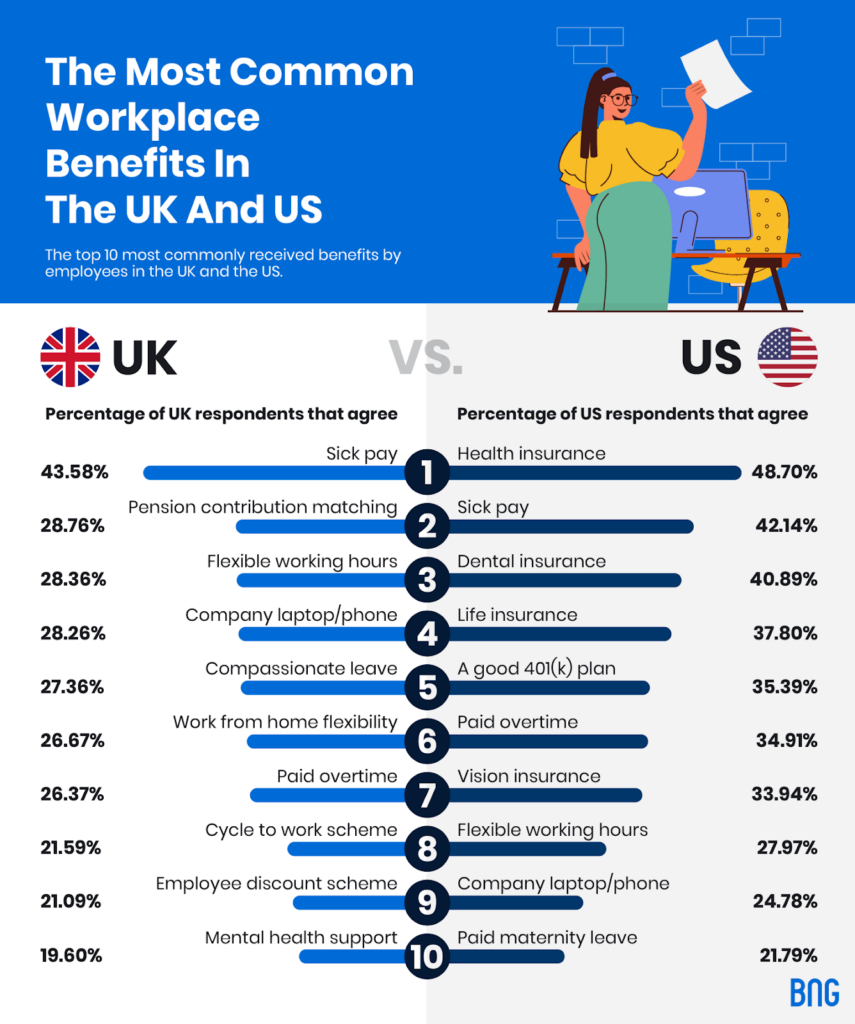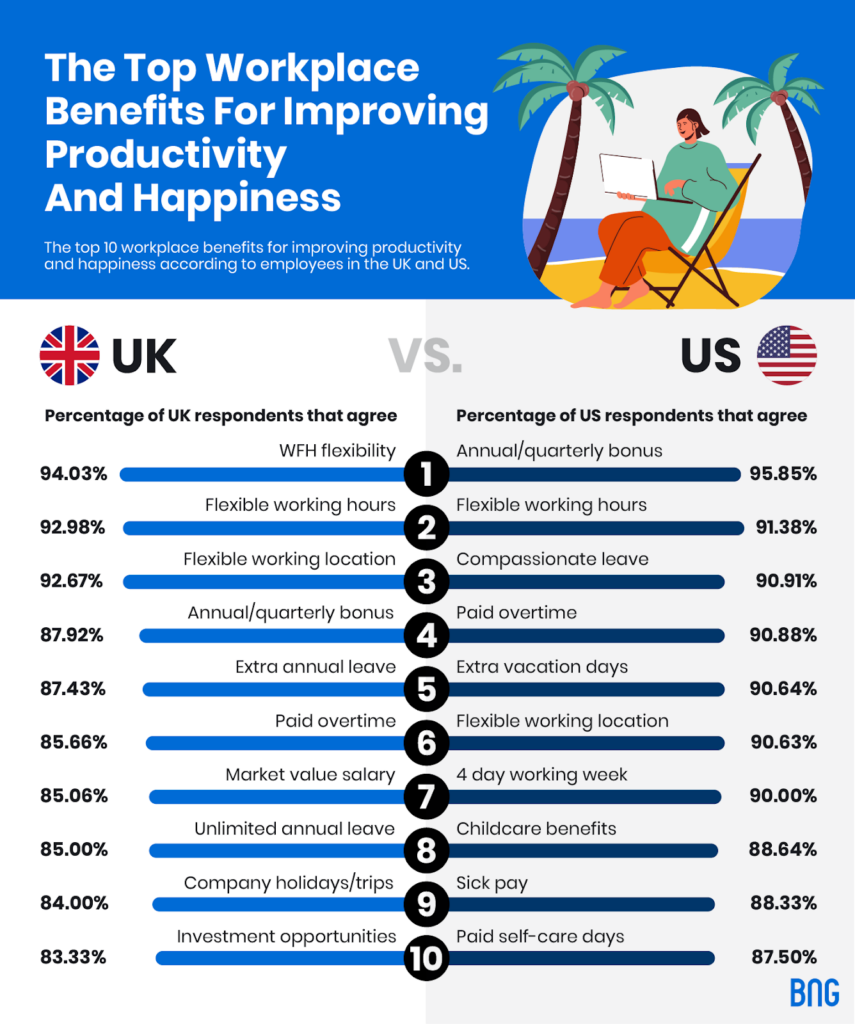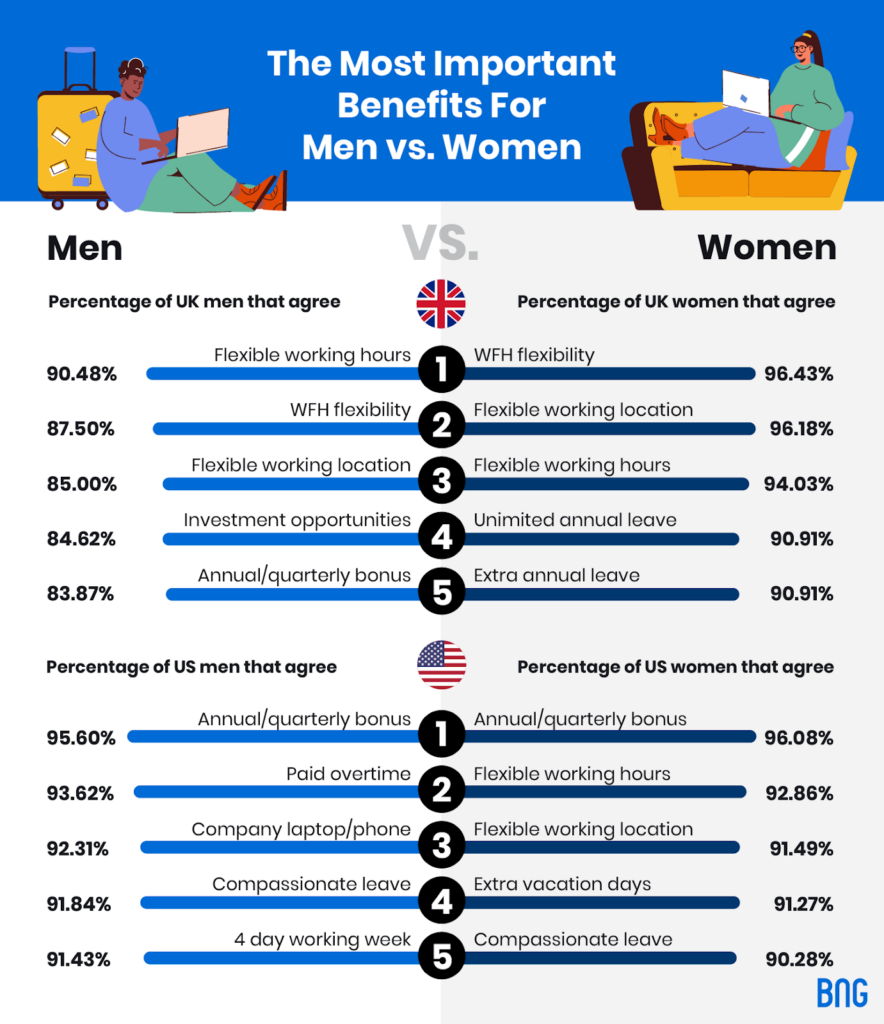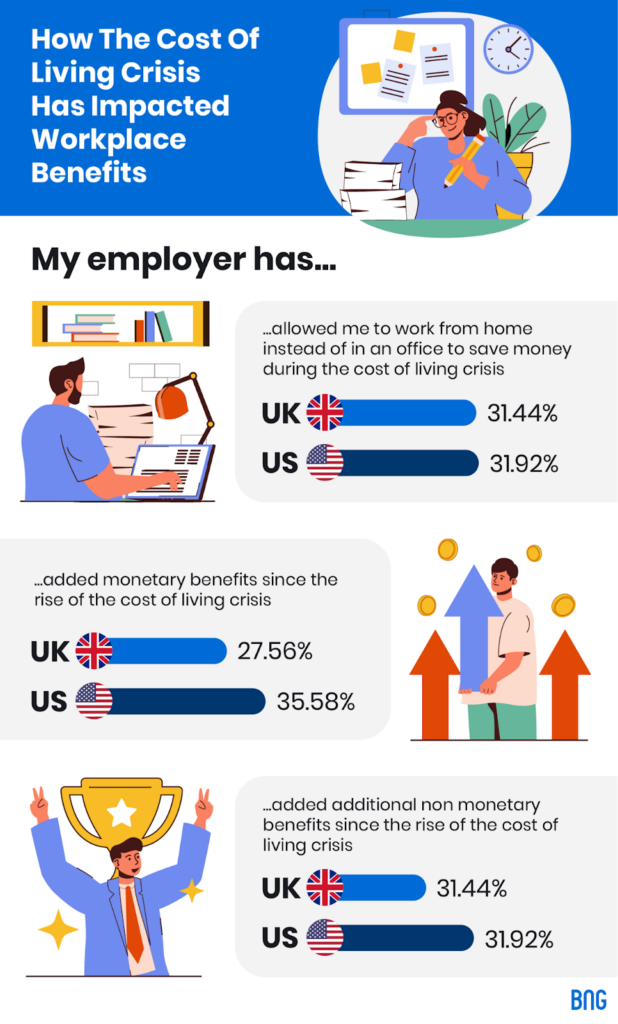Employees now, more than ever before, are considering jobs beyond salary alone. With the pandemic transforming the traditional office workplace, and the current cost of living crisis causing extra financial pressure, workers are seeking out additional benefits to improve their quality of life.
As a result, there has been an increase in jobs advertising working from home, or hybrid and flexible working conditions as well as extra perks including annual bonuses and 4-day weeks in order to attract and retain employees. But what benefits are employees looking for the most in 2023?
At Business Name Generator, we surveyed over 2,000 UK and U.S. office-based employees to reveal what benefits workers in each country are currently being offered, what is important to them, and what they’d like to see added to their benefits package in 2023.
So whether you are a seasoned business professional or just starting your first business, here are the workplace benefits you need to know about to help to attract and retain talent.
Sick Pay and Health Insurance Are Common Benefits
We started off by asking employees what workplace benefits are available to them in their current role. This revealed strong differences across the pond, reflecting the varying environments of employees.
In the U.S., health insurance ranks as the most common benefit, with 49% of employees receiving this benefit, meanwhile, sick pay is the most common benefit for UK employees (44%).
Compassionate leave, cycle-to-work scheme, and employee discount scheme only rank highly in the UK, whilst U.S. employees less commonly receive these benefits. Both countries’ top 10 most-offered benefits lists are sick pay, paid overtime, and flexible working hours.

Despite working from home becoming increasingly popular in the past few years, just 21% of office-based workers in the U.S. have work from home flexibility, compared to 27% in the UK. Meanwhile, more than a third of U.S. workers receive paid overtime (35%) compared to just a quarter of UK workers (26%).
Interestingly, a higher percentage of U.S. employees are happy with their overall workplace benefits – with 54% agreeing with this compared to just 45% in the UK. Despite this, a significant number of employees don’t believe they know all of their company’s workplace benefits – with 30% of UK respondents, and 24% of U.S. respondents, reporting this, highlighting the importance of educating employees on the perks offered to them.
UK Want WFH Flexibility While US Want Bonuses
With our survey revealing that 23% of employees in the UK and 24% in the U.S. feel ‘stressed’ at work, it’s clear that implementing workplace benefits is important for improving employee happiness and wellbeing.
To find out how valuable employees on both sides of the pond find the workplace benefits offered to them, we asked which benefits received are the most important for improving workplace productivity and happiness.
In the UK, flexibility in all its forms is most valued. A staggering 94% say working from home flexibility increases their work productivity and happiness. Both flexible working hours and flexible working locations are also selected by 93% of respondents.
In the U.S. however, an annual or quarterly bonus is identified as a key to productivity and happiness by 96% of employees. Similar to the UK, flexible hours are rated highly – with 91% lauding this.
But in third place for Americans, nearly 91% who receive compassionate leave as a benefit chose this as important for improving their productivity and happiness – a benefit only offered to less than 12% of respondents in the U.S.

Unlimited Vacation Days and Cycle to Work Schemes Aren’t in Demand
At the other end of the scale, the ‘unlimited vacation days’ experiment appears to have failed in the U.S. Shockingly, just 3% of the employees surveyed who receive this benefit say this helps to increase their work productivity and happiness. This could be due to employees prefering to have a set number of vacation days rather than being the one responsible for deciding how much leave they should take. This could explain why 91% of employees who receive extra vacation days as a benefit say this has helped to improve their happiness and wellbeing.
Volunteer and charity days and employee referral schemes are among the lowest ranked among Americans for improving their workplace happiness and wellbeing (63% and 65% respectively).
In the UK, the cycle-to-work scheme ranks lowest (37%), with childcare vouchers (52%) and volunteer days (56%) also among the least popular for improving happiness and wellbeing at work.
The Top Benefits According to Men vs. Women
Our survey revealed interesting differences between men and women from each side of the pond regarding which benefits we value the most.
Men and women in the UK mainly value flexibility with hours, location and being able to work from home, with these three benefits sitting in the top three for UK respondents. However, where UK men value investment opportunities and an annual/quarterly bonus in fourth and fifth, women value unlimited annual leave and extra annual leave.
Whilst benefits around flexibility are the most important for men and women in the UK, an annual or quarterly bonus tops the list as the most important benefit for men and women in the U.S.
The top five most important benefits for men in the U.S. show they are more likely to value paid overtime, having a company laptop/phone and a 4-day working week, whilst women are more likely to value flexible working hours, a flexible working location and extra vacation days.

Younger Generations Favour Flexibility and Monetary Benefits
In the context of a changing workplace landscape, it’s also interesting to see how different generations are prioritizing certain workplace benefits over others.
In the UK, 100% of the Gen-Z workforce (aged 18-24) who have received a cost of living payment agreed that this is the most important benefit for improving their productivity and happiness in the workplace. In the U.S. 90% of employees within this age range voted for flexible working hours as the most important benefit.
Meanwhile, millennials aged 25-34 in the UK favor unlimited annual leave whilst those in the U.S. regard an annual or quarterly bonus to be the top priority. For adults aged between 35-44 in the UK, WFH flexibility is the most important benefit whilst a one-off bonus to help with the cost of living crisis is the most important for those of the same age group in the U.S.
Whilst younger generations are favoring flexibility and monetary benefits above all else, respondents aged between 45 to 55 and over in the UK and U.S. have a longer list of benefits they perceive as being important for workplace happiness and wellbeing. Across both countries, these benefits include a 4-day working week, commission schemes, bringing your dog to work and subsidized travel.
Flexibility Vs Paid Overtime
We have covered what the most common workplace benefits are, and what benefits are the best for improving happiness and wellbeing. But what benefits on offer are currently being used the most?
Interestingly, UK respondents say they use work from home flexibility the most (23%) compared to just 15% of Americans. Meanwhile, it is women in the UK who use this benefit the most of all, with a significant 28% utilizing this.
Meanwhile, the most commonly used benefit in the U.S. is paid overtime (24%), whereas just 14% of employees in the UK say they commonly use this benefit.
Surprisingly, less than 8% of Brits and just 11% of Americans say they regularly use in-office perks such as breakfast, coffee and snacks, suggesting employers could be wasting resources on this common benefit.
Half of Employees Wouldn’t Apply For a Role If The Benefits Weren’t Good
Understanding what benefits employees are looking for is important to employers hoping to attract the best talent. Especially In competitive job markets, employees may not even apply for jobs which don’t advertise the workplace benefits they have come to expect.
Beyond this, not offering the right benefits such as flexible work and maternity pay can increase barriers for women, leading to male-dominated workplaces.
However, the biggest bugbear for job hunters is not including salary information in the job description. More than 60% of respondents in the UK and 53% in the U.S. agree this is a ‘red flag.’
Further to this, 46% of Brits and 51% of Americans say they wouldn’t apply for a job that doesn’t have good monetary benefits whilst 37% of respondents in the UK, and 45% in the U.S., say they wouldn’t apply for a job that didn’t have good wellbeing benefits.
Perhaps unsurprisingly, employees are less likely to apply for a job if the company’s workplace benefits in general are below the standard expected – with 49% agreeing with this in the UK, and 53% in the U.S. This highlights the importance of making sure workplace benefits are up to date and desirable in order to avoid missing out on the best talent.
Perhaps the most damning statistic is the number of employees who say they have left a job because of a lack of workplace benefits. In the UK, this was nearly 23% of respondents, however in the U.S. this was 32%.
U.S. Employees Receive More Cost-of-living Monetary Benefits
The cost-of-living crisis has made workplace benefits more vital to employees than ever before. With the pandemic and the supply chain crisis pushing the cost of essentials through the roof, many employees are relying on their employers to help ease their financial stress.
But how exactly have employers been helping to alleviate some of the worst impacts?

A close 31% of British employees surveyed, and 32% of Americans, say that they have recently been allowed to work from home instead of in an office to save money due to the cost of living crisis.
Similarly, U.S. employees have seen more non-monetary benefits since the cost of living crisis, with 31% enjoying free lunches in the office and subsided travel. This compares to just 21% in the UK.
Similarly, U.S. employees have seen more additional non-monetary benefits since the cost of living crisis, with 31% enjoying the likes of free lunches in the office and subsided travel. This compares to just 21% in the UK.
Furthermore, 45% of Americans, compared to 37% of Brits, said their company is open to hearing about what workplace benefits its employees want to see.
Key Takeaways
With pressures only set to intensify, workplace benefits are going to continue to be a sticking point for employees, who will ultimately vote with their feet by leaving companies that lag behind their expectations.
Companies re-evaluating the perks they have on offer – to best align with the benefits current and future employees value the most – has never been more important.
Methodology
We conducted a survey of 1,037 U.S. employees and 1,005 UK employees in office-based roles in March 2023 to find out what workplace benefits they currently receive, how important they are for their happiness and wellbeing and how they feel about the current state of their workplace benefits.